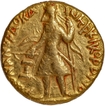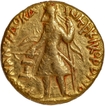This Lot is closed.
- P-Auction # 42
- Bids: 0
- Views:332
| Start Price 600000 | Estimated Price 600000-800000 |
| login, to view Hammer value | |
| Quick Description | ||||
|---|---|---|---|---|
| Denomination | Gold Dinara | Metal | Gold | |
| Full Description: Kushan Dynasty, Kanishka I (127-140 CE), Gold Dinar, “Lrooaspo (Drvaspa)” type, Main Mint in Bactria (Balkh?), Late phase, Obv: the diademed king standing facing the left, holding a spear in his left hand and sacrificing over an altar on the left field, with flames on his right shoulder, the Bactrian legend "ÞAONANOÞAO KA-NHÞKI KOÞANO" "Shaonashao Kanishki Koshano" (King of Kings, Kanishka the Kushan) around the field, Rev: God Drvaspa, diademed and bearded, standing facing the right, holding a diadem in the right hand, a caparisoned horse behind, standing right with left foreleg raised, a tamgha in the right field, the Bactrian legend “ΛPOOACΠO” in the right field, a dotted border around the field, 7.3g, 18.25mm, (Gobl # 57/Variant of Shrava # 128), good quality overall, about very fine, Exceptionally Rare. Note: The identification of the enigmatic Zoroastrian deity Lrooaspo remains speculative, and its origin is a topic of conjecture. One hypothesis posits that Lrooaspo may be an adaptation of Drvaspa, an Avestan deity associated with the protection of animal health and as the "Guardian of the health of the beasts". Alternatively, Lrooaspo might serve as a representation of the Mithraic deity Apam Napat, known as "the grandson of the waters" and affiliated with Neptune. According to the Avesta, Apam Napat is characterized by the epithet Aurvat-aspa, denoting "possessing a swift horse" (Yašt 19.51). With connections to both Mithra and Drvaspa, Lrooaspo is intricately linked to the preservation of Khavaeno, signifying legitimate princely authority. Possibly indicated by the inclusion of a diadem in his portrayal on this coin. For the first time in our auction history, we are presenting this coin, making it a significant opportunity for advanced Kushan collectors and those with a particular interest in Zoroastrian subjects. | ||||



